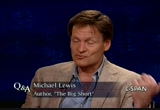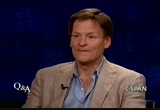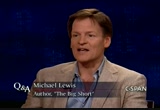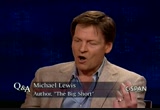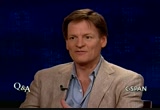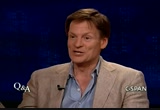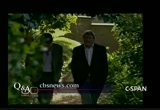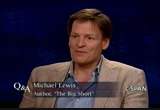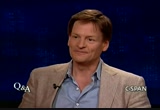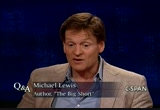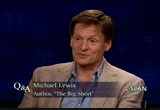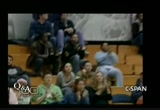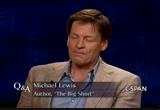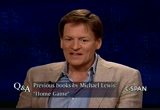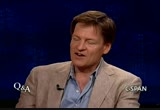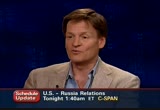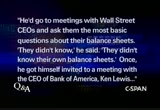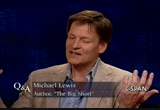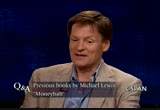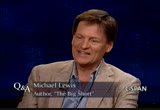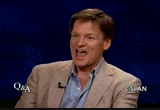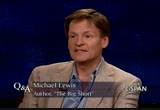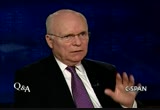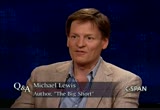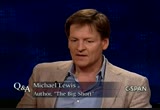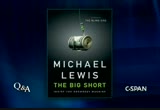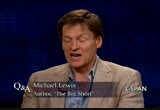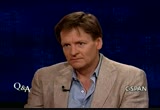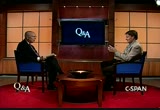tv [untitled] CSPAN April 4, 2010 11:00pm-11:30pm EDT
11:00 pm
and we are in a unique position. what we need is to develop a road map so that we can get it done. >> something about energy policy to talk about on your blog? at our new video library, you can search it, watch it, clip it, and share it. from yesterday's or 10 years ago, every c-span program since 1987. the c-span video library, capel's latest gift to america. .
11:01 pm
so that is the way people talk. i just don't change it. in a way, it would be manipulating the environment if i changed it. >> have you thought about how often it happens? it is almost every day. >> it is probably not almost every page. >> every time -- >> there is one character in particular. in fact, i did think about it. i thought about how they spoke when i was writing them, the characters, and they are a
11:02 pm
character who uses pro fanity at all. >> who is that? >> michael burke, the doctor. he doesn't use farrah fanity. but there is a character, steve, who exists in the story and in the real world to run around and insult people on wall street. that is how he sounds. so i couldn't remove it. i just simply couldn't remove it. it was too much a part of it. he is on a lot of payments, and when he talks, that is what comes out of his mouth. >> in the end of your book, not actually the last chapter, but you have lunch with a former leader of a company that you worked for? >> yes. >> how do you pronounce his name? >> john goodfriend, the c.e.o. of of solomon. i worked a couple of years there. >> your f-ing book, why did he
11:03 pm
say that to you? >> he said that book destroyed his career. he kept repeating that line. he was just emphasizing how intensely he felt about it. it was an awkward moment. i don't completely agree. actually, he did make my career. it was a great way to start a literary career. the book was a big success. he could have survived my book. my book dealt him at most a glancing blow. he was thinking here is this guy that i have never laid eyes on as far as i know, who wrote this book, has followed me wherever i go and caused me some announce, and i am going to say what i think about it. i let him say it. >> pronounce it again? >> gutfroind.
11:04 pm
>> why did you end the book this way? >> i started my book walking back into the place i left, wall street, when i was 27 years old and had never really come back to as a book writer. i was drawn back to the because of the experience i had then. one of the themes that is teased out in the story is that an-off -- an awful lot of the crisis we have been living through has its seeds that happened in the 80's actually on the trading floor i worked. and so i thought it was appropriate to end the book to the person who was there and kind of got it all going. gutfroind in particular was a seminal figure in wall street history because he had taken this legendary bond trading
11:05 pm
partnership, solomon brothers, and turned it public. this completely changed the relationship of the wall street firm to the rest of society. it was a very big deal. that is another thing i say in the book. it was the pebble that was kicked off the top of the cliff that led to the avalanche. i thought it was an important first act, and i wanted to go to the man and talk to him about it, to see if he saw the connection from then and now. >> you get one of the biggest send-offs you can get on my book tour, 60 minutes, two segments. how did that come about? >> i still vice president seen it. but it came out of the blue. steve croft, the interviewer, i thought he was fabulous, really wanted to do it. when he showed up at my house in berkeley, he said we tried
11:06 pm
to do you two or three years ago when blind blind came out. but you told your publisher you wouldn't talk to us because you said they would steal all the material and not mention the book. i was so used to them appropriating material and helping them do the piece, and you were forgotten. i just thought this was a waste of time. i think i had already told 60 minutes no once. they came back to the publisher, i guess, and they said we are actually serious. we are interested in the book he is doing. so in a moment of weakness, i caved. i thought it was going to be a small and trivial piece on this book. i didn't know what it was going to be actually. they came, and they spent two days. my wife kept asking are they leaving any time soon? they planted themselves in the house for two days, and we sat and talked. it was great.
11:07 pm
i had no idea. fling having not seen the pace, i can't really comment on it. it is an interesting experience, doing media. unlike this experience. you sit and talk to them for five or six hours, and it get reduced to 20 minutes. because you said so many things in six hours, you really don't know what is going to come out of it. the main sensation one has when one is engaged in this pursuit is total self boredom. how could anybody be interested in me? i just bored myself for six hours, and they are going to reduce it to a more boring piece. >> they only focused on one of your characters. >> mike byrd, the one who didn't use f-bomb.
11:08 pm
>> in reading the book, he was an interesting character, and so was steve. did they tell you why they focused on him, or did steve eisman say i am not going to participate? >> steve said i am not going to participate. i had privileged access to wall street because of liars poker and other things. people were willing to talk to me who weren't willing to talk to other people. i developed relationships with these people over a long period of time. it became an intimate experience. it was just me and him hanging around talking, and yeah a book was going to come out of it. they didn't think much about it. the book is by him, and i trust him. now the book comes out, and they are getting calls from 60 minutes. steve is technically employed by morgan stanley, and they
11:09 pm
don't want him to go on the hair. he doesn't want to go on television. and charlie may and hawkins, the young man at cornwall capital, who i had to badger to let me write about them, i think they are on an island. the last thing they wanted was to be on tv. they spoke to the producers and said i will explain things to you, but there is no way my face is going on television. >> why did mike, who you characterized in your people as shy and not liking people -- >> he doesn't like social interaction. >> why did he agree? >> that is a great question, but there is a simple answer. a year and a half ago he felt completely betrayed by the financial world. >> he's on screen now. >> and he felt neglected. he thought he had been very pressured in diagnosing what was going on in the american
11:10 pm
financial system. he had made a lot of money for other people. it wound up being a very un pleasant experience for him. then the world moves on, and nobody notices what he has done, even though it was an incredible investment triumph. when i talked to him, he was the one character who was very a egger to talk to me. he had a story, and he had three years of e-mails to document his every move. he had a story to tell that he thought will be neglected. the 60 minutes people were reinforcing that. he wanted to tell his story. >> the next day, amazon, you are number one, and a week later when this is being taped, you are still number one on amazon. but you didn't show up on the "wall street journal" in their poll for the week. >> the way the best seller list works generally, things that
11:11 pm
are in the papers are usually with a lag. so you wouldn't -- the "new york times" best seller list and the journal best seller list is sales from two weeks ago. the book hasn't been on sale long enough to hit those lists. the market for it has surprised even me. the market for it seems to be vast. that is really great. it is nice. i was trying to get my mind around what is going on with this book right now because it is clearly a reservoir not just of anger about what happened, but real intense curiosity to know what actually happened on wall street that i didn't expect. i thought actually trying to get people to read my story was going to be more difficult than it has been. >> new orleans was your birth? >> it is where i grew up. it is where most of my gene
11:12 pm
pool is. >> princeton is your university? >> yes. >> and you went to berkeley. >> yes. >> and you are married to somebody my age would remember. >> tab that soren. >> i remember her on mtv in the early days. >> she was 22 or 21 when she went on the air. she used to anchor the news for mtv and interview rock stars and so forth. we have three kid, two daughters and a son, age 10, 7 and 3. the only major piece of my biography is i went to graduate school in london. i spent eight years living in evening land right after college. >> and an art history major at princeton? >> yes. >> liars poker came out in 1989. he worked at solomon brothers two years? >> more like three, almost three. i got there in the summer of 1985, and i left in early 1988.
11:13 pm
>> and can you give us a couple of lines about liars poker? >> sure. liars poker, the fuel for that story was that anybody would be willing to give me large sums of money to give them investment advice. i had an economic dedegree from the school of leon con, but it didn't have anything to do with giving investment advice. as interested as i was in kind of the sociology -- well, the finance at solomon brothers, but i wasn't particularly well sueded for telling people what to did ith with their money. i didn't feel like i was making a useful contribution to the global economy, but it was pretty clear if i sat in that seat, i would get rich. that was puzzling.
11:14 pm
why should anyone get paid all this money just to sit in this seat. the trick was just getting to the seat. so i wrote -- i left to write a story about it, a non-fiction story. it was always trying to explain what had happened on wall street to make these sort of jobs possible, to make them so lucrative. but i really did think when i wrote it that this was it. in the 1980's, it was a strange episode in american history. it was going to end, and these seats would be less valuable. so you had to get the story down on paper so future generations would believe it. little did i know people would pity me for how little i made when i was there. the sums paid on wall street had gotten so big that that just looked quaint. >> first person in your book is meredith whitney that seems to have a rather strong importance. can you tell us who she is? >> she is a catalyst for me in this story. she was until very recently was
11:15 pm
a an analyst. she worked for a wall street firm that offered stocks to the public. she worked for a firm called oppenheimer. she was a bank analyst, a financial sector analyst. and meredith, who i had never heard of, starts saying things. in late 2007 was when i started paying attention about the wall street firms that was different than anything i had ever heard. she was saying they basically didn't under the risks they were taking. they didn't understand their balance sheets. she predicted stick would have to cut or eliminate their dividend a week before they actually do. she seems to know more about those places than the people who ran them.
11:16 pm
she was almost condescending to the wall street people. i called her up. she was making a different sound. i thought, i haven't been writing about this world, but i am curious about who this woman is and why she says this. she made such sense that she persuaded me early on, she didn't put it this way, i put it this way, that the wall street firms had become the dumb money at the poker table. the last thing you wanted to do was be on the other side of a solomon brothers trade. there were some zero sum bets that you did not make because you were sure to lose money. the institutions had become stupid. they had become the dumb money. that made me curious. something big had changed. and then the natural question of course was if they were the dumb money, who was the smart money? that led me to my characters. they were the smart money.
11:17 pm
>> there is another word said throughout your book besides the f-word, the word lie. >> right. >> time and again that people in these companies lied to each other, lied to us. >> right. >> i want to read you a little bit of one paragraph -- >> it was a word of a character. >> i am pelling this out of page 174. he would go to meetings with wall street c.e.o.'s and ask them the most basic questions about their balance sheets. >> yeah. >> is that fair? >> is it fair? >> yes. it is absolutely a pure
11:18 pm
representation of his view. those kind of statements tell you -- they are very important in a story like this because they are as revelatory about steve iceman as louis. is the guy dumb? no, he can get out of bed in the morning. he is not that dumb. but he is dumb in the sense that he doesn't persuasively understand his own business. that is eisman's blunt way of getting the point across. >> let's talk about steve. where is he from and where does he live? >> steve eisman was led to me by meredith whitman because she had trained under him. he was new york born and bread,
11:19 pm
had gone to the university of pennsylvania, brilliant student. went to harvard law school, brilliant school, joined a corporate law firm and hated it immediately. and so he called his mom, as one does when one is in trouble, and his mom and father, they were both prominent brokers at oppenheimer securities, and his mom got him a job as a junior analyst, analyzing nothing as first. in the mid 1990's when he joins, the subprime mortgage market is just beginning. the mortgage market called a subprime market is originating. someone asks him if he wants to be the analyst on it. he becomes one of the first two or three annual e.u.s of subprime mortgage companies on wall street. and pretty quickly, he is the
11:20 pm
world expert on the subject. >> how old is he? >> he is in his mid 40's now. when this happened, he was in his early 30's. >> you paint in the book that he changes eventually, but he seems angry and negative about sh and says things? >> as the character, it didn't occur to me until one of his colleagues pointed it out. they said when the curb your enthusiasm came on to hbo, the larry david show, he said they stole that. that is steve. he is larry david. he runs around offending people. his wife says to me my husband is rude. he has no manors. i know that. i have tried and i have tried, and there is nothing i can do about it >> he is tactless throughout the story, but there is a pattern, which sort of endeared him to me. he was never rude or mean to little people. he wasn't mean to the secretary. he wasn't mean to his nanny.
11:21 pm
he was wonderful with them. he was protective and caring about the people beneath hem. who he was tactless to were people in power, who he thought you were abusing their positions. he would get angry. he would find himself in meetings with wall street big shots and saying things that would cause the meeting to come to an end, that caused the wall street big shot say i am never setting foot in the same room with about this man again. it came to the point where his subordinates that he was working with, the fund he was managing, they would stop their jobs for the day to follow him because they want to see the show. they know if he is going to be meeting someone important on wall street, something is going to happen they are going to want to see. they say it is like watching a car crash to watch eisman in a social situation. >> and he didn't want to be
11:22 pm
interviewed on camera for 60 minutes? >> he didn't. i am grateful for these people for letting me into their lives and letting me write about them as i did. i don't blame them for not wanting to be on tv. some people have that bug, but it doesn't change your life a bit to have your face known. >> do you have that bug? >> to be on tv? no. i get offered every now and then the chance to have a tv show, and it doesn't interest me. i did do -- i tell you, my interest in television was caught rised by the bbc. about 10 years ago my wife and i lived in paris for a year, and i did a series of documentaries for the bbc baskly to pay for a house renovation, and i had to wander around and be on camera all the time. it was a documentary, and i loathed it. the interesting bits of what i do is learning about something and communicating it in words.
11:23 pm
then having to get the pictures to go with it, and stand up in front of the camera, it is unbelievablely tedious. if you don't have a picture of it, you can't communicate it on tv. i would rather create the picture out of words. i don't particularly like it. i have had to get used to it, but when you go on the road to sell a book, a lot of it is done on tv. i am not good at it, and i don't particularly like it. >> i picked a paragraph on page 68. it is wrong. i want you to define all this stuff. you even say in a footnote, if you have gotten this far, god bless you. i am going to read this. it doesn't have to be a long explanation, but to try to get through and understand all this language. >> the jargon. >> we will start. the subprime mortgage market was generating having a trillion dollars worth of new loans a year --
11:24 pm
go back to subprime mortgage. dwipe that. >> you know what a mortgage loan is. you borrow money to buy a house. a prime mortgage loan is to someone, a borrower, who has a credit score over a certain number. credit scores are supposedly measuring the likelihood you're going to repay your loan. there is a company called the fair isaac corps that generates a score that suggests what the likelihood is. there are different definitions, but above on a scale of 800, above a 660 is a prime mortgage. below 660e is a subprime mortgage. >> that doesn't mean the prime lending rate. >> no. it is the person who is doing the borrowing. >> when the goldman-sachs sales woman called mike berry and
11:25 pm
told him -- two things here. the credit default swap. >> sure. this is the mechanism that was created in 2005 to bet against the subprime mortgage market. credit default swap is essentially an insurance policy on a security. so if i buy a credit default swap on a subprime mortgage, and i am buying it, i pay you, the seller, a premium, a couple of percent a year. and in exchange, you have to pay me the whole value of the subprime mortgage bond if the bond goes bad. i bought insurance on that bond. the general idea of it is that people who own subprime mortgage bonds moit like to have the ability to -- might like to have the ability to by
11:26 pm
insurance on them as a hedge. it's a silly idea because you could just not by the subprime mortgage bonds in the first place if you were worried about the risk. that is why they were created. but they quickly become tools for speculation. instead of buying a credit default swap, i hedge my bet on a subprime mortgage bond. what he is buying is an insurance policy on the bond. >> you refer in your book to the other side of the bet. >> it is a bet. the whole financial system at this moment in financial history is organizing itself around a bet, and the best are subprime mortgage loans. they are essentially just pools of loans. they are a bunch of people who borrowed money to buy a house, and are they going to pay off their loans or not? the vast majority of the people
11:27 pm
bet yes. some bet no. >> i am going to by a house. i go to a bank, and you sign on the dotted line. you owe them $100,000 to keep it simple. >> right. >> and then the next thing you hear, that mortgage has been sold. who does the bank sell it to? >> the simple step is they sell it to a wall street firm that pools it together with lots of other loans in a trust and then issues bonds offer the trust. so the money coming in from you to pay off your loan is now going to some bondholder, and he could be anywhere. it could be germany, japan or anywhere. he is the ultimate lender. so the ultimate lender is very far removed from the borrower. >> so it could be somebody at goldman-sachs? >> yes, very likely. >> if i were originally going
11:28 pm
to write checks to the bank, i am now writing checks to goldman-sachs. >> you don't see that. there is some servicer of your mortgage who is standing in between. the wall street firm doesn't actually get your money from you. >> let me get back to the paragraph. go to insolvent americans. how many of them were that bought these subprime mortgages? >> well, the dollar volume is unbelievable. to put it in perspective, the subprime mortgage loan does not exist until the mid 1990's. it has a brief life, and it is maybe $10 background to $30 billion a year. >> it came from where? >> from where? >> yes. who promoted it originally?
11:29 pm
>> several companies were born all at once that existed to originate the loan, to go find people to lend to and package them into securities and bonds and sell them off. there was a company called aims financial, the money store, green tree. these companies don't exist any more. >> fill rizutto did the ads,? >> i don't know. this was before my time. it has to do with what happened in the american economy. you had lots of people living beyond their means and using their credit cards to do it. credit became one of the big changes in american life in the last 20 or 25
205 Views
IN COLLECTIONS
CSPAN Television Archive
Television Archive  Television Archive News Search Service
Television Archive News Search Service 
Uploaded by TV Archive on

 Live Music Archive
Live Music Archive Librivox Free Audio
Librivox Free Audio Metropolitan Museum
Metropolitan Museum Cleveland Museum of Art
Cleveland Museum of Art Internet Arcade
Internet Arcade Console Living Room
Console Living Room Books to Borrow
Books to Borrow Open Library
Open Library TV News
TV News Understanding 9/11
Understanding 9/11
